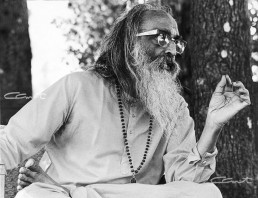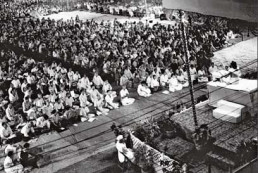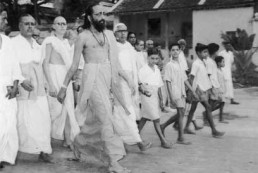
The spectacular success of Pujya Gurudev in reaching the message of our scriptures to the people at large was in no small measure the result of his acumen in understanding human nature and bringing out the full potential of every individual, not only in the spiritual arena, but also in worldly affairs. Not everyone is evolved spiritually to engage in meditation right away. So he created appropriate fields of activity, which would allow full play of a variety of individual talents and at the same time direct the person on the spiritual path. For example, a person who loves teaching can run a Balavihar class, lead a study group or teach in any of the Chinmaya Vidyalayas. One who is good at financial management has his work cut out in running an ashram. He taught many people how to organize a jnana yajna and trained them so well that they would be the envy of professionals in event management.
Under his efficient and inspiring guidance, Chinmaya Mission grew by leaps and bounds, spreading its wings all over India and abroad. He imparted administrative skills to all the acharyas also, equipping them to run local centres, while imparting spiritual teaching in the community. His far-reaching vision initiated the social work and health education program in Sidhabari, which has now expanded into a full-fledged Chinmaya Organization for Rural Development called CORD.
Advice about men and matters abounds in his letters. He teaches people how to handle situations, how to relate to others, how to grow spiritually, by performing actions selflessly as an offering to the Lord. Below is a small collection of Gurudev’s letters on these topics.
Organising Events
Pujya Gurudev taught many people how to organize a jnana yajna and trained them so well that they would be the envy of professionals in event management. In this collection of letters he teaches how events should be organized as well as what defines a successful event.
How to work
In all his actions Pujya Gurudev set an example of how one should work. His letters on how work should be done, and how he himself worked, give us the recipe for success.

The spectacular success of Pujya Gurudev in reaching the message of our scriptures to the people at large was in no small measure the result of his acumen in understanding human nature and bringing out the full potential of every individual, not only in the spiritual arena, but also in worldly affairs. Not everyone is evolved spiritually to engage in meditation right away. So he created appropriate fields of activity, which would allow full play of a variety of individual talents and at the same time direct the person on the spiritual path. For example, a person who loves teaching can run a Balavihar class, lead a study group or teach in any of the Chinmaya Vidyalayas. One who is good at financial management has his work cut out in running an ashram. He taught many people how to organize a jnana yajna and trained them so well that they would be the envy of professionals in event management.
Under his efficient and inspiring guidance, Chinmaya Mission grew by leaps and bounds, spreading its wings all over India and abroad. He imparted administrative skills to all the acharyas also, equipping them to run local centres, while imparting spiritual teaching in the community. His far-reaching vision initiated the social work and health education program in Sidhabari, which has now expanded into a full-fledged Chinmaya Organization for Rural Development called CORD.
Advice about men and matters abounds in his letters. He teaches people how to handle situations, how to relate to others, how to grow spiritually, by performing actions selflessly as an offering to the Lord.
Below is a small collection of Gurudev’s letters on these topics.
Organising Events
Pujya Gurudev taught many people how to organize a jnana yajna and trained them so well that they would be the envy of professionals in event management. In this…
How to work
In all his actions Pujya Gurudev set an example of how one should work. His letters on how work should be done, and how he himself worked, give us the recipe for…

